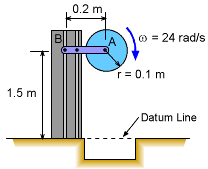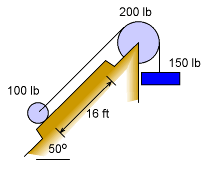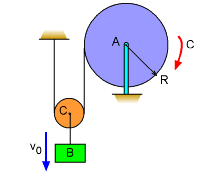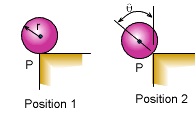Assignment:
Question 1. Find the total energy of the system at the given instant if the 20 kg disc has an angular velocity of 24 rad/s (clockwise), the bar AB has a mass of 2 kg, and the system is 1.5 meters above the ground. Assume the ground as the datum line (zero potential energy).
a. 353 J
b. 389 J
c. 294 J
d. 323 J
e. 429 J

Question 2. A cylinder is pulled up a plane by the tension in a rope which passes over a frictionless pulley and is attached to a weight of 150 lb as shown. The cylinder weighs 100 lb and has a radius of 2 ft. The radius of the pulley is 4 ft. The cylinder moves from rest up a distance of 16 ft. What will be its speed?
a. 11.3 ft/s
b. 13.8 ft/s
c. 14.7 ft/s
d. 12.6 ft/s
e. 10.3 ft/s

Question 3. A 20 kg block B is attached to the system consisting of a 50 kg drum, A, and a 15 kg pulley, C. Drum A is uniform and has a radius R of 25 cm. At the instant shown, the block is falling at a rate v0 of 7 m/s. If the block will stop after it descends 5 m, what is the required constant braking couple C to be applied to the drum? Note that all the cords are inextensible and their weight negligible.
a. 62.8 N-m
b. 85.2 N-m
c. 75.6 N-m
d. 35.9 N-m
e. 14.6 N-m

Question 4. A uniform sphere of radius r is placed at corner P and is given a slight counterclockwise motion. Assuming that the corner is sharp and becomes slightly embedded in the sphere, so that the coefficient of static friction at P can be taken as a very large value (no slipping), determine the angle θ through which the sphere will have rotated when it loses contact with the corner.
a. 80.0o
b. 54.0o
c. 20.5o
d. 34.0o
e. 62.5o
